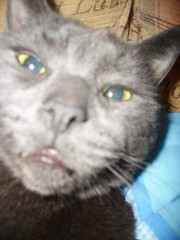Well, I’ll be a monkey’s … nephew
Technically, we’re not actually descended from monkeys. As I understand it, us and monkeys are both descended from a separate common ancestor. So we’re descended from the idiomatical monkey’s uncle.
Or at least, that’s the commonly accepted evolutionary belief. It’s also accepted by me, so you’re not going to hear any arguments about it here. The reason I studied biology at university was — primarily — because I find evolution fascinating and interesting.
The principle of natural selection (”the survival of the fittest”) isn’t the whole story of course, although it does provide some fascinating examples, such as melanism in the Peppered moth. There is also of course sexual selection (this is why peacocks have long showy tails — they provide no benefit other than making it more likely they’ll get a mate, but the improved chance of passing on their genes through being sexually selected more than makes up for the extra energy investments required up to that point.
The key thing to remember is of course that selection only works up to the point at which someone is likely to have children. If some illness becomes apparent only later in life — something like Huntington’s Chorea, which generally exhibits in the mid-40s — then this won’t be selected against by natural selection to any great degree, because people who get the disease won’t generally have been suffering at the point they were having children and passing their genes on.
Evolution as a subject is simply fascinating. While I get annoyed with his preachifying and militant atheism, Richard Dawkins has written some astonishingly good books on evolution (The Blind Watchmaker and The Extended Phenotype being two favourites); then you’ve got people like the late Stephen J. Gould, an extraordinary evolutionary essayist.
And the writer Charles Darwin is praised for all of this, because his book On The Origin Of Species in 1859, one hundred and fifty years ago this year, is lauded as the father of evolution. And while he does indeed deserve praise for the idea of natural selection, it’s important to remember that it would have happened without him — it was because other people were working on the same sort of ideas that Darwin published On The Origin Of Species at the time.
But he does deserve credit. And that’s why I’ve decided to publish a photo of Darwin to commemorate the publication of OTOOS, and also as a kind of a birthday thing, since Charlie was born 200 years ago in February 1809. So happy birthday, Charlie. Congratulations on being 200. Commiserations on being dead.
Well, yes. I don’t have any photos of Charles Darwin, but I do have a cat called Darwin (and one called Einstein, but that’s a different scientific discipline), and so I instead present a photo of him.
Just to recap then, 150 years ago, Charles Darwin published On The Origin Of Species, one of the great scientific works, and very much kicked off the concept of evolution as we know it. He had a big beard in lots of pictures. However, this picture, whilst obviously hairy, is not of Charles Darwin. It’s a cat.
(Unless of course his theory was wrong, and people turn into kittens 121 years after we think they’ve died, in which case it might be a photo of Charles Darwin, but if this is the case, we shouldn’t be commemorating him anyway, as his theory will have been completely wrong, as I’m sure it doesn’t mention anything about turning into a cat after you’ve died.)


 Hello. I am
Hello. I am 
As you say, Charles Darwin is lauded as the father of evolution, but as a biologist you probably know that his main contribution was not the concept of evolution (which was already very old; see History of evolutionary thought (in Wikipedia’s Evolution article) and History of evolutionary though (the full Wikipedia article)) but the theory of natural selection as a mechanism for evolution (also independently discovered by Alfred Russel Wallace. Will there by a Wallace year in 2023? I doubt it.).
hi we love you
Ah bless, that’s lovely, if somewhat suspiciously looking like spam. But maybe I’m just overly cynical.
Either way though, it’s not entirely relevant to this post, however. Might I suggest that in future any similar endearments — whether spam or otherwise — are directed through the contact form? Even the a whole lot of lovin’ post might have been a bit more relevant…